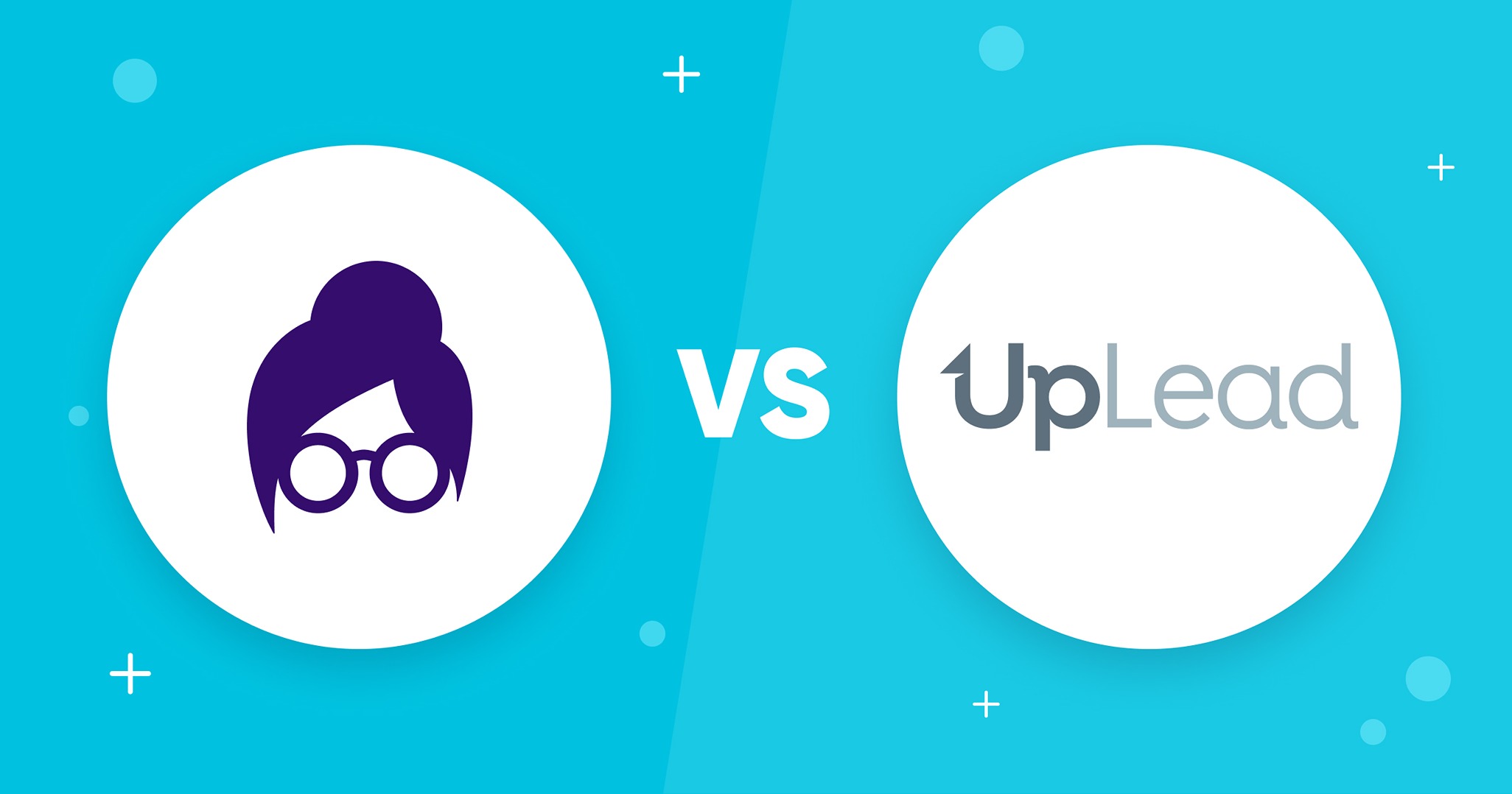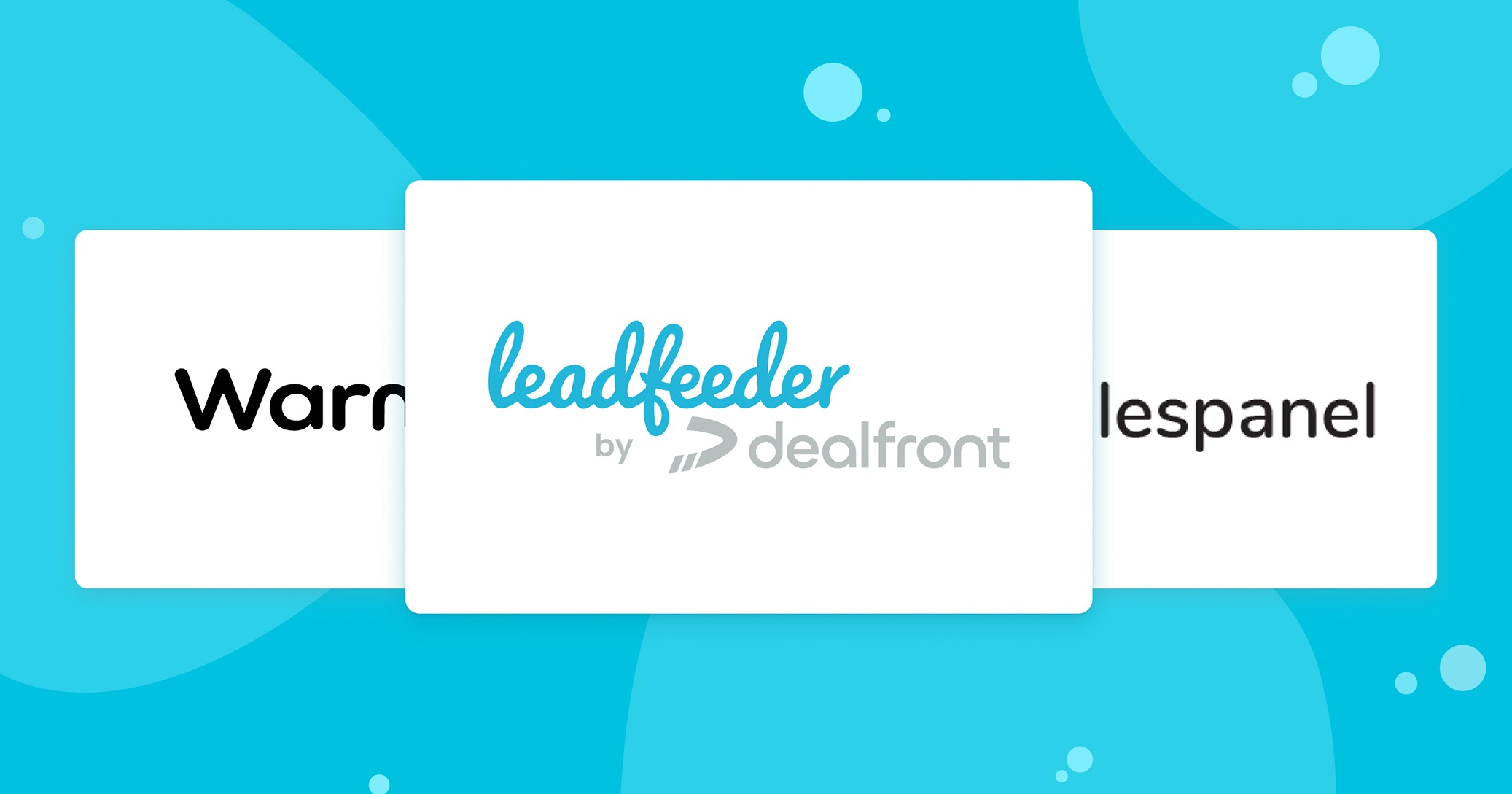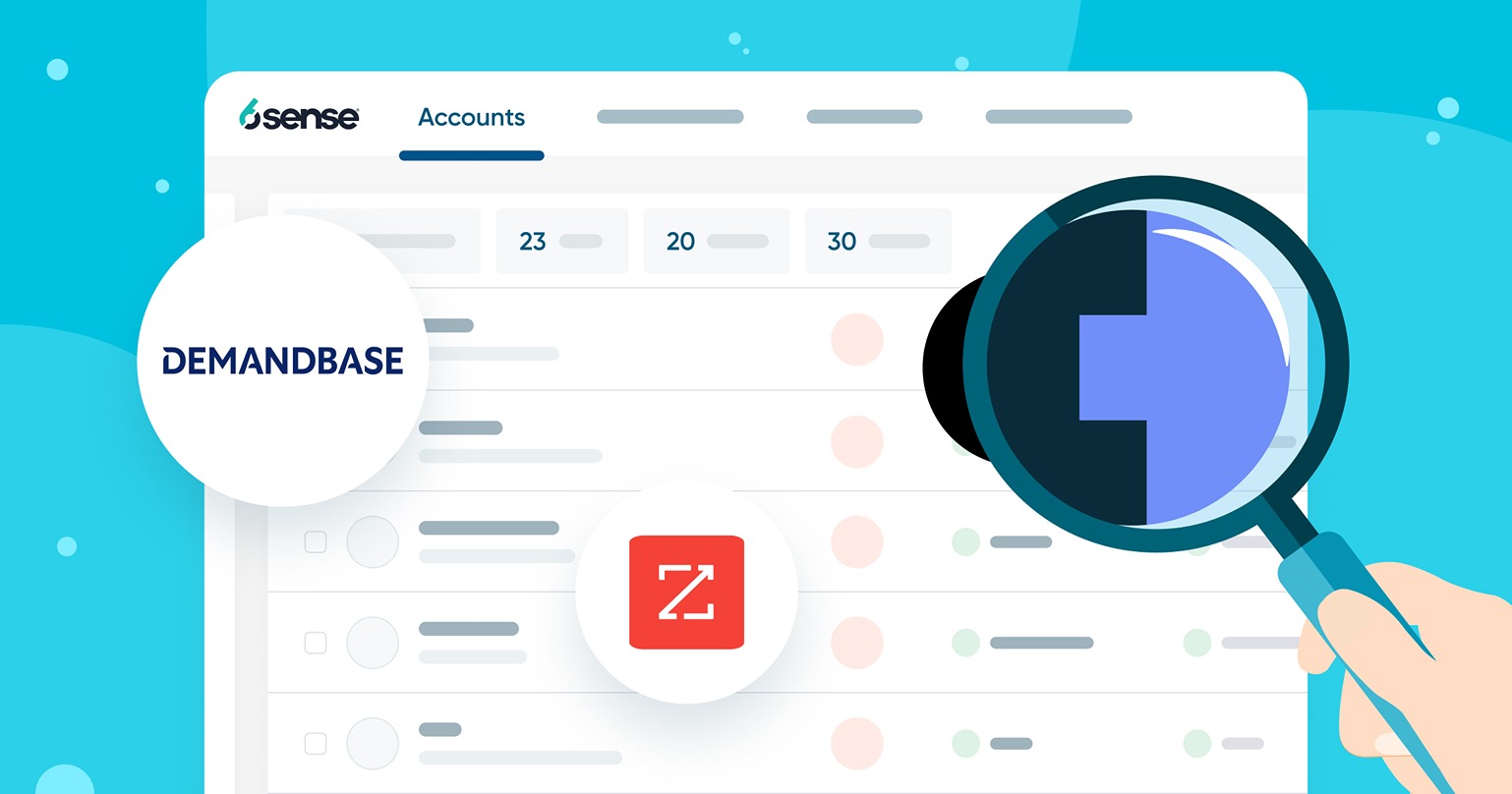Not getting what you need from Leadfeeder? While it’s excellent for tracking website visitors, it might not have the data depth, filters, or pricing flexibility your team needs.
If you’re looking for a tool that fits your exact prospecting goals, here are 12 Leadfeeder alternatives, each with its strengths and limitations.
Top Leadfeeder Alternatives to Consider
1. UpLead
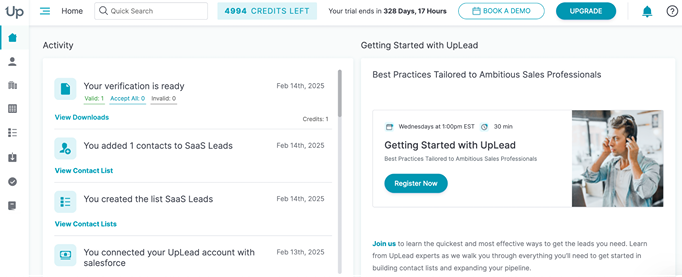
Best For: B2B teams that need accurate, real-time verified lead data with flexible prospecting options.
UpLead focuses on high-accuracy contact data, real-time email verification, and intent signals. While Leadfeeder identifies website visitors, UpLead gives you a broader approach: You can build targeted prospect lists and see who’s researching your sector.
It excels at filtering (e.g., industry, revenue, or software used) to quickly find qualified leads.
Pros
- Real-time verified data reduces bounces.
- Flexible filters by location, industry, and technology stack yield specific, relevant data.
- Intent data pinpoints high-intent leads for timely outreach.
Cons
- Trial credits offer a quick product overview but may not support large-scale testing.
UpLead Features
- Prospector Tool: Build targeted lists with multiple filters, including revenue range and tech usage.
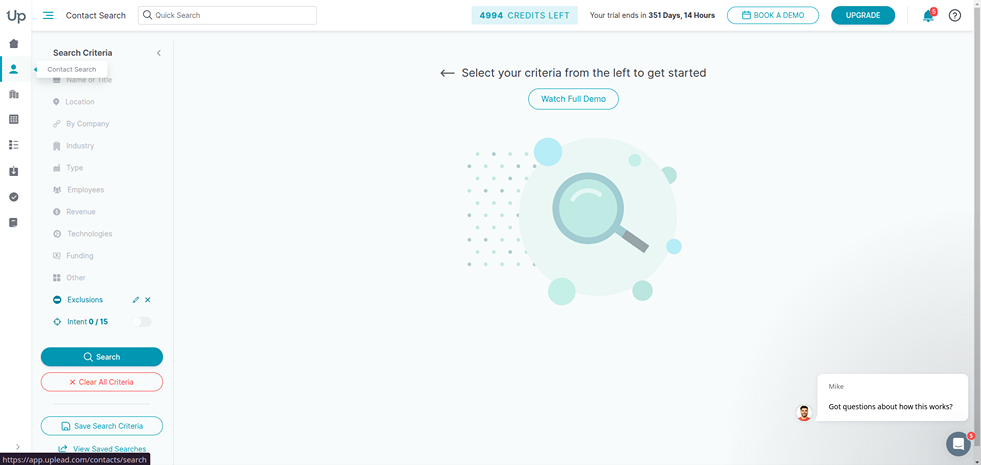
- Intent Data: Identify signals that indicate buying interest so you can reach out to prospects at the right time.
- Chrome Extension: Collect verified data on LinkedIn or company sites without switching tabs.
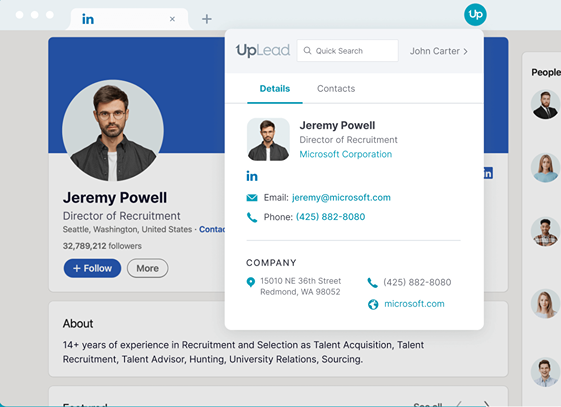
- Data Enrichment: Fill in missing fields (e.g., phone, email, or job title) and ensure existing data is correct.
- API Access: Connect UpLead data to your internal systems.
UpLead Plans & Pricing
Here are UpLead’s pricing plans, each personalized to different prospecting needs:
- Test Drive (Free Trial) – $0 for 7 days (5 credits)
- Essentials (Monthly) – $99/month (170 credits)
- Plus (Monthly) – $199/month (400 credits)
- Professional (Annual) – Custom pricing (for more info, contact sales)
What Customers Say
One G2 reviewer praises UpLead as a “game-changer,” highlighting its clean, accurate data and supportive team. They rely on it daily to connect with the right prospects and vendors, calling the outreach process effortless.
2. ZoomInfo
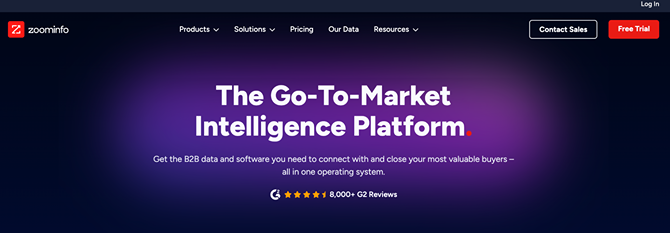
Best For: Large sales teams that need extensive global data, org charts, and advanced analytics.
ZoomInfo is a leading B2B intelligence platform that offers extensive contact coverage and direct dial information. Compared to Leadfeeder, ZoomInfo delivers deeper account insights, including company hierarchies, real-time funding alerts, and advanced enrichment. Its ability to quickly identify decision-makers across departments makes it a strong choice for enterprise-level sales teams.
Pros
- A database of over 155 million business contacts, emails, and phone numbers, far exceeding Leadfeeder’s focus on website visitor tracking.
- Real-time email verification to ensure accurate contact data before outreach.
- Technographic filters to identify prospects based on their tech stack, intent signals, and firmographic details.
Integration with CRMS platforms like Salesforce, HubSpot, and others for enriched lead data.
- Advanced search filters and saved lists to streamline prospecting efforts.
- Data enrichment tools to fill in missing details and create new sales opportunities.
Cons
- Higher price points can be challenging for smaller teams.
- Data accuracy can vary by region or industry.
ZoomInfo Features
- Org Charts: Visualize chains of command to identify multiple stakeholders.
- Scoops & Valuable Insights: Get alerts on recent funding rounds or leadership changes.
- Technographics: See which software tools a company uses for more tailored outreach.
- Data Enrichment: Bulk-update incomplete records with verified details.
ZoomInfo Plans & Pricing
Here are the ZoomInfo plans:
- Lite – Free (up to 10 contacts per month)
- Professional – Starts at $14,995/year (5,000 annual bulk credits)
- Advanced – $24,995/year (10,000 annual bulk credits + 1,000 monthly credits per user)
- Elite – $39,995/year (10,000 annual bulk credits + 1,000 monthly credits per user)
What Customers Say
One G2 reviewer calls ZoomInfo Sales an “improved product,” highlighting Copilot’s ability to provide timely account data to sales directors. They praise the thorough onboarding, note strong support from the account manager, and mention only minor Salesforce integration limitations.
3. Clearbit
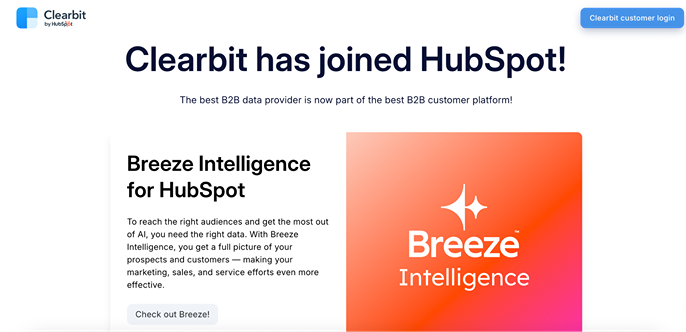
Best For: Marketing and SaaS teams that need real-time data enrichment and quick access to detailed prospect information.
Clearbit enriches inbound leads and sign-ups by appending valuable firmographic and social data in seconds.
Clearbit improves captured leads with detailed insights, including industry, job titles, and social profiles. It provides rapid data updates through flexible APIs, making it ideal for businesses that need real-time personalization and advanced marketing automation.
Pros
- Offers visitor tracking (Reveal) to identify key accounts.
- Wide array of customization options for different campaign needs.
Cons
- Credits-based pricing models, dependent on database size, may be confusing.
- Advanced features sometimes require extra technical setup.
Clearbit Features
- Enrichment API: Append firmographics and role data to form submissions in real time.
- Reveal: Identify otherwise anonymous visitors to tailor personalized marketing campaigns.
- Prospector: Search for new leads using filters like industry, location, and employee count.
- Data Segmentation: Group leads by role or company size to improve targeting.
Clearbit Plans & Pricing
Here are the Clearbit pricing plans:
- Enrichment (Archived Data) — $99/month or $199/year
- Prospector (Archived Data) — Starts at $999/month or $12,000/year
- Company Headcount Tier — $17,100 for ~200 employees, up to $80,700 for 1,000+ employees
What Customers Say
A Limo services provider notes that Clearbit “quickly gathers customer demographics, firmographics, and other key data. By aligning marketing and sales strategies with these insights, the team can run more focused outreach and close deals sooner.”
4. Cognism
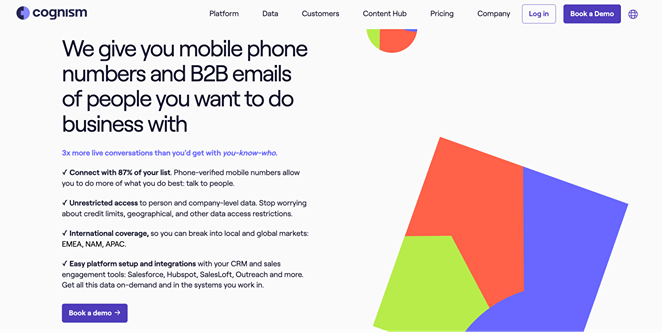
Best For: Global teams seeking GDPR-compliant, phone-verified lead data.
Cognism is a compliance-focused B2B platform offering real-time data verification across multiple regions. It focuses on phone-verified contacts and advanced compliance standards by delivering more reliable direct dials and specialized features for regions with strict privacy regulations.
Pros
- Provides high-quality contact data with verified emails and mobile numbers.
- Custom revenue range filters enable more precise targeting.
- Offers stronger B2B sales intelligence with direct prospect data.
Cons
- No transparent pricing.
- Limited free trial (only 25 leads).
- Requires a sales call to access trial data.
Cognism Features
- Intent Data: Detect when leads are actively researching your solution.
- Phone Verification: Reduce invalid numbers and improve call outreach.
- CRM Integrations: Sync data easily with Salesforce or HubSpot.
- Sales Intelligence: Gain insights into engagement patterns to refine targeting.
Cognism Plans & Pricing
Cognism does not disclose specific pricing on its website. Here are Cognism’s pricing details:
- Free Trial – 25 targeted B2B leads (requires consultation with a data expert)
- Platinum Plan – Contact data, company insights, hiring/funding tracking, CRM integrations
- Diamond Plan – Everything in Platinum, plus phone-verified numbers, intent data, and data enrichment
What Customers Say
Multiple users cite Cognism’s high-quality data and intuitive interface, making lead generation and sales intelligence more efficient. The platform’s custom revenue range filters and contact data indicators help refine targeting, leading to more accurate and effective outreach via mobile and email.
5. Albacross
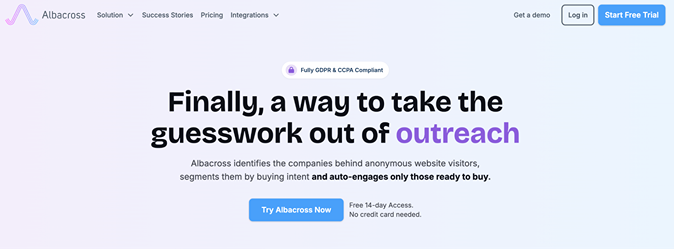
Best For: Companies that want to track anonymous website visitors and score potential leads.
Albacross tracks company visits and enriches them with firmographic details, helping businesses better understand their audience. Its automated lead scoring stands out by prioritizing high-value accounts, making it easier to focus on the most promising prospects.
Pros
- Strong website visitor tracking, similar to Leadfeeder, but with automated lead scoring to prioritize high-value prospects.
- Easy CRM integration.
- Real-time visitor insights help businesses act quickly on warm leads.
- User-friendly interface with simple setup compared to some competitors.
Cons
- Limited contact-level data compared to Leadfeeder’s more firmographic insights.
- Focuses mainly on website analytics and lacks direct prospecting tools like UpLead.
Albacross Features
- IP-to-Company Matching: Detect which organizations browse your site.
- Lead Scoring: Rate visitors based on how they engage with content.
- CRM Sync: Stream visitor data directly into your pipeline.
- Visitor Insights: Review page views and session durations to gauge interest.
Albacross Plans & Pricing
Here are the Albacross pricing plans:
- Starter – €79 per user/month (billed yearly)
- Professional – €127 per user/month (billed yearly)
- Organization – €159 per user/month (billed yearly, minimum 3 users)
What Customers Say
Albacross is a powerful tool for identifying website visitors and running targeted outreach, but its pricing feels high for the features offered. Users praise its automated reports and ad-targeting capabilities but also cite the limited integrations for social media sites like LinkedIn and Facebook.
6. ListKit
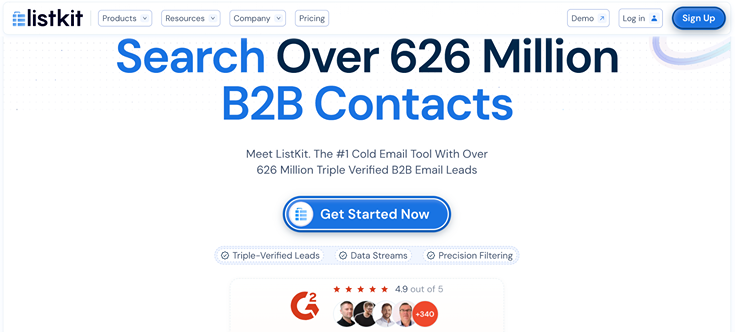
Best For: Teams that prefer outsourcing lead generation to a service rather than managing it themselves.
Using human research, ListKit compiles contact lists based on your criteria, such as location, industry, or job title. Compared to Leadfeeder, which provides insights into engaged companies, ListKit offers pre-vetted prospect data for direct outreach without relying on website activity.
Pros
- Provides high-quality, manually verified lead lists, reducing bounce rates.
- Ideal for teams that prefer done-for-you lead generation rather than managing data themselves.
- Flexible pricing with pay-per-list options, making it cost-effective for smaller teams.
Cons
- Turnaround time can be slow since leads are manually sourced.
- Limited automation features, requiring external tools for outreach.
ListKit Features
- On-Demand Lists: Request custom audiences without setting up filters yourself.
- Manual Verification: Human checks to validate emails and phone details.
- Data Guarantee: Some plans offer free replacements if you find inaccuracies.
- Effortless Ordering: Simply specify your requirements and wait for the curated list.
ListKit Plans & Pricing
Here are the ListKit pricing plans:
- Professional – $97 per user/month
- Scale – $297/month (up to 3 users)
- Enterprise – Custom pricing
What Customers Say
A reviewer on Reddit discovered ListKit while exploring B2B email generation tools and was intrigued by its Intent Data feature, which allows users to pull data on people searching for specific keywords. However, they note that this feature is only available on the Pro plan, and other users echoed frustration at the pricing plans.
7. Apollo.io
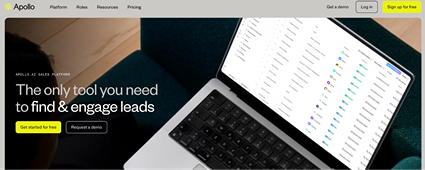
Best For: Businesses want an all-in-one solution combining data sourcing with integrated outreach tools.
Apollo.io offers an extensive database of B2B contacts and built-in sequencing for emails and calls. It combines lead discovery with automated outreach, making it a better fit for teams looking to manage prospecting and follow-ups in one place.
Pros
- Larger database with extensive contact and company details compared to Leadfeeder.
- Built-in email outreach tools for direct prospecting.
- Automated workflows and sequences streamline sales efforts beyond Leadfeeder’s capabilities.
- Data enrichment and intent signals provide deeper insights into prospect activity.
Cons
- Less focus on website visitor tracking, which is Leadfeeder’s core use case.
- Limited real-time company identification, whereas Leadfeeder specializes in tracking anonymous visitors.
Apollo.io Features
- Contact Database: Millions of verified leads searchable by role, industry, or geography.
- Sequence Automation: Automate drip campaigns for email and calls.
- LinkedIn Extension: Export contact info directly from LinkedIn profiles.
- Metrics Dashboard: Track opens, replies, and call outcomes in one place.
Apollo.io Plans & Pricing
Here are Apollo.io’s pricing plans:
- Free – $0/month
- Basic – $39/user/month (annually) or $49/user/month (monthly)
- Professional – $79/user/month (annually) or $99/user/month (monthly)
- Custom – Starts at $5,000/year
What Customers Say
A G2 reviewer shares that Apollo.io makes outbound sales easier with its built-in email automation and a vast, high-quality contact database. However, they criticize the limitation of not being able to map multiple users under a single account.
8. Seamless AI
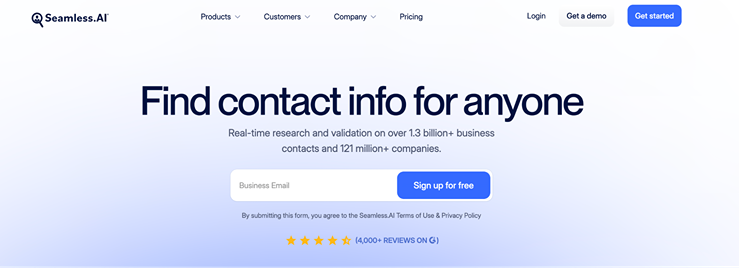
Best For: Sales teams seeking AI-driven lead discovery and quick verification across multiple online sources.
Seamless AI focuses on real-time contact data collection, offering verified emails and phone numbers sourced from multiple online channels. It’s more suited for teams that require direct access to decision-makers for outbound sales and cold outreach.
Pros
- Faster contact discovery with real-time web scraping.
- Browser extension makes LinkedIn and website prospecting easier.
- CRM and marketing automation integrations streamline outreach.
- Data enrichment and verification reduce bounce rates.
Cons
- No website visitor tracking.
- Data inconsistencies may require manual verification.
Seamless AI Features
- AI-Driven Searches: Collates data from social media, company pages, and other open web sources.
- Bulk Prospecting: Allows you to upload multiple names or domains to find leads in volume.
- Verification Checks: Flags invalid or risky emails to lower bounce rates.
- Browser Plugin: Capture leads as you navigate LinkedIn or official websites.
Seamless AI Plans & Pricing
Here are the pricing plans offered by Seamless AI. The platform does not disclose exact pricing, so you’ll need to contact sales for details.
- Free – 1 user, 50 credits
- Pro – Pay per user, daily credit refresh
- Enterprise – Custom pricing, unlimited users
What Customers Say
A LinkedIn user finds Seamless.AI a powerful tool for real-time contact discovery, helping sales teams access fresh, accurate data. They highlight its strong AI-driven search but note occasional inconsistencies and a higher price for larger teams.
9. LeadIQ
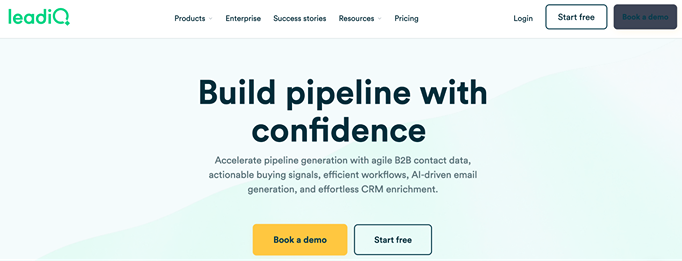
Best For: Sales teams that want quick LinkedIn data collection and straightforward lead handoff to their CRM.
LeadIQ gathers contact details directly from LinkedIn profiles, letting you transfer them into your CRM or email outreach tool. It excels at real-time LinkedIn scraping and quick contact creation, making it better suited for teams whose primary prospecting happens on LinkedIn.
Pros
- More accurate contact details (emails and phone numbers) than Leadfeeder, making it better for direct outreach.
- Free plan available with 50 credits per month, while Leadfeeder only offers a free trial.
- Easier CRM integration with direct syncing to Salesforce, Outreach, and SalesLoft.
- AI-powered email generation helps automate outreach, which Leadfeeder lacks.
Cons
- Limited visitor tracking.
- The free plan is restrictive for larger teams.
- No deep website analytics like Leadfeeder, making it less useful for understanding visitor behavior.
LeadIQ Features
- LinkedIn Capture: One-click button to pull verified emails from LinkedIn.
- Email Outreach: Launch drip campaigns straight from the platform.
- CRM Sync: Automatically update Salesforce, HubSpot, or other CRMs.
- Collaboration: Tag colleagues and share leads within the same workspace.
Plans & Pricing
Here are the LeadIQ plans:
- Free – $0/month, 20 email credits, 10 mobile credits
- Essential – $36/user/month (annual) or $45 (monthly), 1,000 email credits, 50 mobile credits
- Pro – $79/user/month (annual) or $89 (monthly), 2,000 email credits, 100 mobile credits
- Enterprise – Custom pricing, 10,000 email credits, 200 mobile credits
What Customers Say
A G2 reviewer shares that LeadIQ has an easy-to-use interface, CRM integration, and accurate data for prospecting. The free plan with 50 credits per month is a big plus, making it an excellent option for small teams.
10. Demandbase
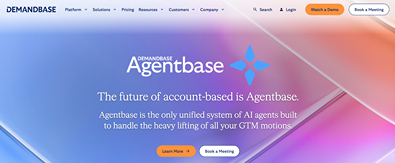
Best For: B2B marketers looking to use account-based strategies and tailor content to specific businesses.
Demandbase zeroes in on account-based marketing (ABM), customizing website experiences and ads for identified companies. It also adds advanced personalization and predictive analytics to move leads through the funnel.
Pros
- Stronger ABM features than Leadfeeder, making it better for targeting high-value accounts.
- AI-driven intent data helps identify prospects actively researching, which Leadfeeder lacks.
- Deeper firmographic and technographic insights for B2B sales teams.
Cons
- Real-time website visitor tracking lacks detail.
- Heavily focused on enterprise users, while Leadfeeder is more accessible for SMBs.
- Requires more data input and strategy, whereas Leadfeeder works with minimal setup.
Demandbase Features
- Account Identification: Maps site visitors to specific organizations.
- Intent Signals: Identify and prioritize leads already at the buying stage.
- Ad Personalization: Serve tailored ads to your key accounts.
- Journey Analytics: Track each account’s activity across various channels.
Demandbase Plans & Pricing
Demandbase’s pricing structure is customized to each organization’s unique needs. Each plan includes a platform fee that covers essential software and services, complemented by a flat per-user fee for scalability.
What Customers Say
On Gartner Peer Insights, a user praises Demandbase for its balance of simplicity and depth, making it easy to use while offering advanced targeting. However, they note that essential add-ons like orchestration were not clearly highlighted upfront, leading to unexpected budget adjustments later.
11. RocketReach
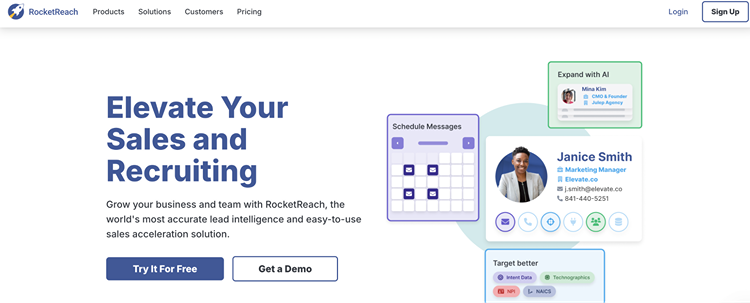
Best For: Individuals and teams needing direct email lookups from names, domains, or LinkedIn profiles.
RocketReach provides verified contact details, including emails and phone numbers, making it optimal for direct outreach. This differentiates it from Leadfeeder’s account-level tracking, which is more suited for anonymous website traffic.
Pros
- Access to over 700 million contacts.
- Advanced search filters for targeted prospecting.
- AI-powered recommendations for relevant leads.
- CRM and API integrations for seamless workflow.
- Chrome extension for quick lookups on LinkedIn and other websites.
- Offers intent data to identify high-value prospects.
Cons
- No website visitor tracking like Leadfeeder.
- Free plan has limited searches before requiring payment.
- Some users report occasional data inaccuracies.
RocketReach Features
- Name/Domain Lookup: Enter a person’s name or a company domain to retrieve verified contact info.
- Bulk Searches: Process multiple names simultaneously for faster prospecting.
- Browser Extension: Grab contact details while browsing LinkedIn or corporate sites.
- Email Verification: Reduce bounce rates by screening out invalid addresses.
RoicketReach Plans & Pricing
RocketReach offers a range of personalized pricing plans to individual users and teams. Here’s a breakdown of their offerings:
Individual Plans
- Essentials – $70/month or $468/year, 1,500 annual lookups
- Pro – $140/month or $1,188/year, 3,600 annual lookups, unlimited phone numbers
- Ultimate – $300/month or $2,988/year, 10,000 annual lookups
Team Plans
- Team Pro – $996/year, 3,600 annual lookups per user, team collaboration tools
- Team Ultimate – $2,480/year, 10,000 annual lookups per user, advanced integrations
- Custom Enterprise – Custom pricing, unlimited annual lookups, premium features
What Customers Say
A Capterra user finds RocketReach easy to use with a high success rate in identifying leads, outperforming other tools tested. They note that the pricing is a bit confusing, but the overall experience has been positive.
12. 6sense
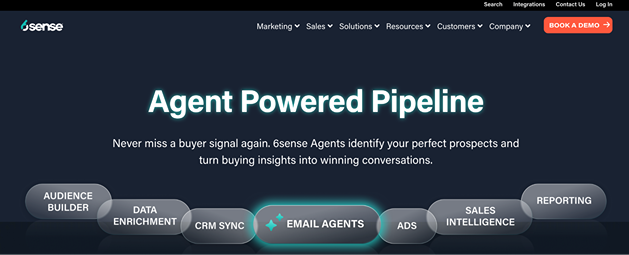
Best For: Enterprise-level teams seeking AI-driven account predictions and precise timing for outreach.
6sense processes multiple data sources to predict which accounts are most likely to convert in the near future. Unlike Leadfeeder, which focuses on a specific engagement metrics, 6sense uses intent data, buyer signals, and AI to anticipate where an account stands in the purchasing process.
Pros
- Predictive analytics for prioritizing sales outreach.
- Deeper insights into buying behavior and sales readiness.
- Multi-source data aggregation beyond website tracking.
- Advanced CRM and marketing automation integrations.
Cons
- No transparent pricing; it requires a demo and custom quote.
- Higher learning curve due to advanced AI-driven insights.
6sense Features
- Predictive Insights: AI forecasts which accounts show the strongest purchase intent.
- Intent Data Integration: Consolidates signals from web, email, and third-party sources.
- Process Orchestration: Aligns marketing and sales actions according to each account’s stage.
- Attribution: Track which campaigns or content drive real engagement.
6sense Plans & Pricing
6sense does not offer explicit pricing details on its website; users must contact sales for a customized quote based on their needs.
- Free – 50 credits/month, buyer discovery, contact & company data, alerts, list management, Chrome extension
- Team – Adds technographic, psychographics, web/CRM/SEP apps, CRM/SEP integration, dashboards
- Growth – Includes 6sense Intent (keywords), 3rd party intent, corporate hierarchy, prioritization dashboards
- Enterprise – Adds predictive AI model, AI-recommended actions, CRM & MAP activity
What Customers Say
A G2 user appreciates how 6sense Revenue AI for Sales simplifies prospecting with powerful filtering tools and intent data for more targeted outreach. However, they also mention that setup can be time-consuming, and some data insights may not always be fully accurate.
Key Considerations for Choosing a Leadfeeder Alternative
Selecting a Leadfeeder alternative requires a clear focus on data accuracy, advanced features, budget constraints, and user-friendly implementation. Whether you’re a sales rep or part of a marketing team seeking B2B website visitor tracking, a robust B2B lead generation tool should be able to handle anonymous website visitors, verify email addresses, and offer visitor identification capabilities all at once.
Before you commit to a tool and its paid plan, consider these factors:
- Data Coverage & Quality
If you send emails to invalid addresses or outdated phone numbers, you’ll waste resources. Look for tools that verify contact information in real time or maintain frequent database updates. High-quality data translates into fewer bounces and more meaningful conversations. - Integrations
A platform that syncs smoothly with your CRM data, marketing automation system, or sales engagement software saves you hours of manual work. Many providers offer direct connectors or open APIs. Confirm that these integrations align with your current tech stack to avoid compatibility issues. - Budget
Different platforms bill by credits, seats, or usage tiers. Calculate the cost per lead or per month to see if it fits your growth strategy. Small teams might benefit from flexible pay-as-you-go plans, while larger organizations can leverage annual deals with higher lead volume. - Implementation
Some solutions can be installed and configured in minutes. Others require more specialized, technical skill. Evaluate your team’s bandwidth, especially if you’re juggling multiple new tools. - Customer Support & Training
Timely support can make or break your experience. Check if the provider has accessible documentation, live chat, or dedicated account managers. Responsive help reduces downtime and helps you adopt new features efficiently.
By comparing factors like data accuracy, integrations, budget flexibility, and training resources, you can choose a Leadfeeder alternative that truly boosts your outreach. The right choice helps you focus on warm leads, run efficient campaigns, and close deals faster.
Why Is UpLead the #1 Leadfeeder Alternative?
UpLead outperforms Leadfeeder across the board by combining real-time verified data, advanced filtering, and intent insights into one intuitive platform. Instead of only tracking B2B website visitors, UpLead provides deeper insights into each prospect’s ideal customer profile, including company size, technographics, and key decision-makers.
This lets you refine your outreach efforts with targeted emails, saving sales teams from manually sorting through anonymous website visitors and speeding up your sales funnel.
Its 95% data accuracy guarantee reduces bounced emails, while intent data signals show you exactly when leads are in buying mode.
Because UpLead works on a transparent credit-based pricing system, it’s easy to scale up or down depending on your prospecting volume. You also benefit from a user-friendly Chrome extension that sources contacts directly from LinkedIn or company websites.
Ready to see the difference accurate data can make? Sign up for a free trial to immediately benefit from verified contact lists, minimal data waste, and higher conversion rates. When it comes to B2B prospecting, UpLead sets a new standard for reliability and reach.
Frequently Asked Questions
Leadfeeder is owned by Dealfront, a company formed by merging Leadfeeder and Echobot.
Yes, Leadfeeder is GDPR compliant because it processes user data in accordance with EU regulations. It also provides options for visitors to opt-out or anonymize their data.
The main difference between Leady and Leadfeeder lies in their feature sets. Leady focuses on identifying companies and delivering simplified analytics, while Leadfeeder integrates more deeply with Google Analytics and offers extra filtering to help qualify leads.

